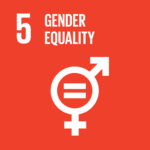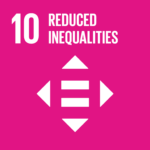16 Days of Activism against Gender-based Violence are being celebrated by the United Nations, under the global theme UNiTE! Activism To End Violence Against Women and Girls!”
Globally, violence against women and girls (VAWG) affects more than one in three women[1], a figure that has remained largely unchanged over the last decade[2]. The most recent global estimates showed that, on average, a woman or girl is killed by someone in her own family every 11 minutes[3].
There’s more evidence than ever that VAWG can be prevented despite these worrying trends. Investing in women’s movements is crucial to ending VAWG in both transnational contexts and domestic policy-making[4], because a strong and autonomous feminist movement is the single most critical factor for policy change. Multi-sectoral coordinated actions by governments and civil society, as well as intensive advocacy and media campaigns by feminist groups, have also been shown to reduce VAWG[5].
RELEVANT SUSTAINABLE GOALS


With 1 in 3 women and girls worldwide still experiencing violence, the need for action is urgent. Each of us can take action in our lives, in our homes, and in our communities today and every day by following these tips. Unite and #PushForward to #EndViolenceAgainstWomenandGirls with 365 days of action.
Stand Up for Victims
Shatter the silence. “It starts with us. It would already be helpful if we “sounded the alarm” whenever we heard screams or cries in the apartment next to ours, if we called the police and other competent institutions, if we comforted and listened to the victim.
In addition, if we didn’t blame the victim, if we didn’t adopt the stereotype that the woman provoked her husband, her partner, rapist or abuser – then we could make a significant impact. That’s something each of us can do.
We need to understand that men and women are not equally at risk and that no woman is to blame for being a victim of violence. There is no justification for beatings, psychological torture, or harassment. We need to teach our daughters and sons about violence against women, and then spread awareness among our friends, colleagues, and social networks in every conversation.
Shatter the silence
Take one simple action, wherever you are: Speak up. If you have experienced violence, you can speak up about your own experience. Even if you have never experienced violence, speak up. Ask how you can help another person out of a situation of violence when you hear their story. You should speak up when you hear people making jokes about violence against women, and tell them, “That’s not funny.” “That’s a serious problem.” Learning more about violence in your area can help you stand up effectively. People need to speak up about the violence in their own lives, in their own community, in their own neighbourhood, family, and extended community first. Then you’ll be able to see how violence against women is also prevalent in other places.”
Calling on men and leaving no one behind
It is critical to promote intersectional approaches that include all kinds of women and LGBT people: trans women, lesbians, queers, non-binary, disabled, indigenous, Afro-descendants, women living with HIV, rural women, migrants, refugees, sex workers, etc. There is no other way to achieve comprehensive measures except by doing so.
Reaching men who are not gender sensitive is the biggest challenge. When working with men, it can become a vicious circle where the same men keep raising patriarchal values or questioning them. Make men aware of how patriarchy affects not only women and LGBT people, but also them, for example, when expressing emotions or caring for their health. In this case, patriarchy is viewed as negative for all people, and the change is favored.
Educating The Next Generation
Gender-based violence – sometimes you can’t relate to it because you don’t understand the gravity of it, or sometimes you don’t want to talk about it. However, we are talking fundamentally about human rights – freedom, safety, and respect. We need everyone on board because this is not a minority issue. It affects everyone.
Education is crucial. This issue is complex, and there are so many layers to address. But education is where everything begins, and that’s where discrimination begins. Our children’s upbringing determines whether they become respectful citizens who respect others’ human rights and treat them with dignity. It’s about how we teach the next generation.
Get Involved
Every person in the world must accept their responsibility to end gender-based violence. Ending gender-based violence is a shared responsibility. To make a difference, we all must start somewhere, and the easiest place to start is within our communities. Consider asking yourself: “What organizations are involved in prevention efforts in my community, and how can I contribute my time?“
Use your influence to spread the message by retweeting or sharing a Facebook or Instagram or TikTok post. Go to forum such as Generationequality.org and find out what the Action Coalition on gender-based violence is doing and how you can get involved. There are so many ways to take a stand. The most critical thing is to do something and do it now!
It is time to unite and end all forms of violence, including sexual assault, sexual abuse, trafficking, stalking, gender harassment, and relationship violence. Join us !
Lead image courtesy of Illustration by Emilia Khan on behance.
You may also be interested in :
How Can You Stand With Mahsa Amini Who Was Killed By Morality Police?



